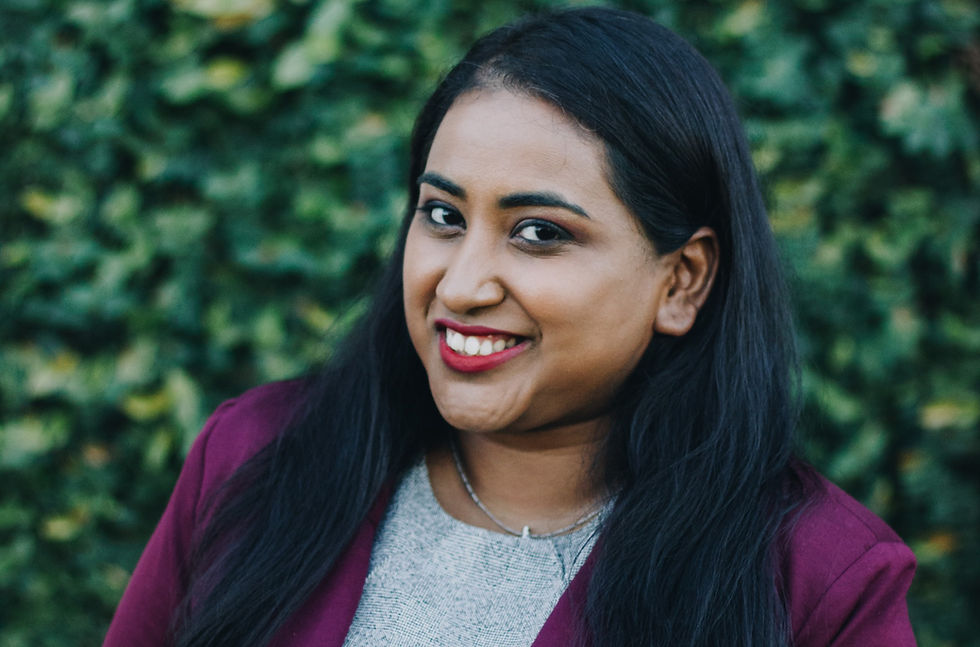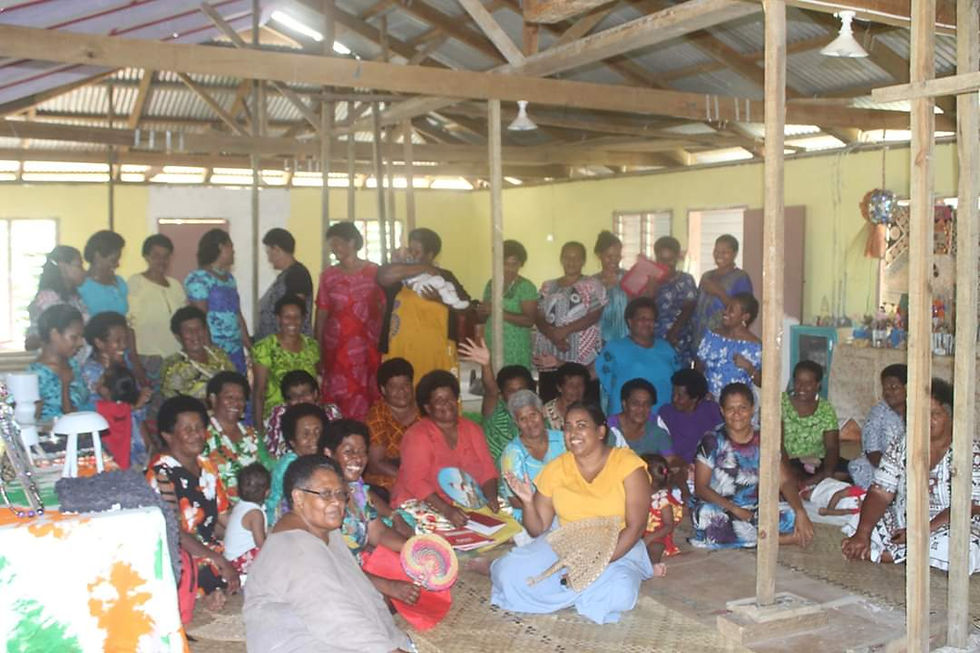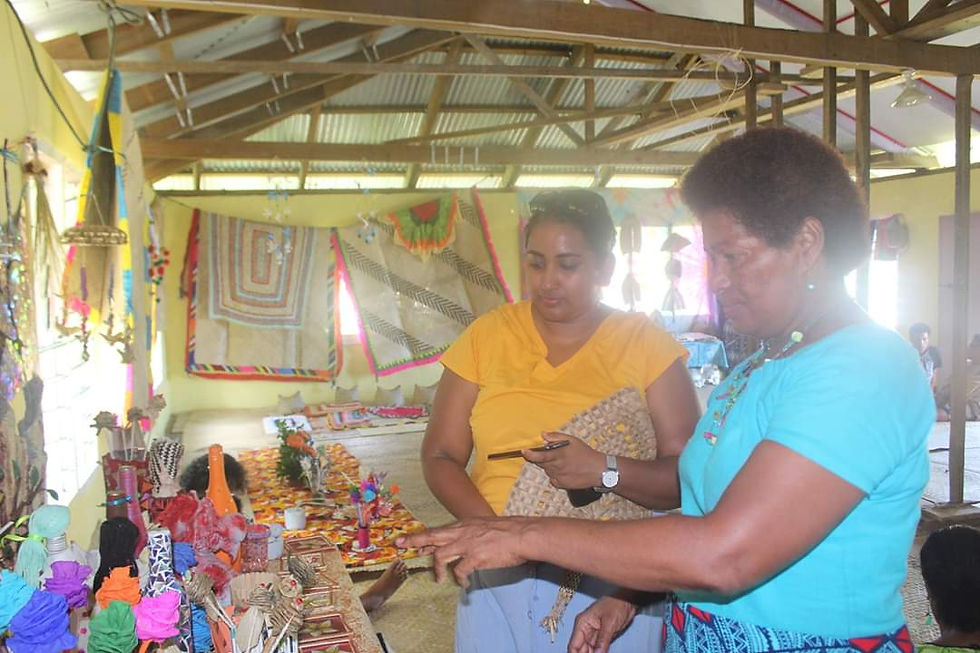Think outside the trash and recycle - Fusion Hub
- Youth Co:Lab

- May 27, 2021
- 4 min read
Updated: Jun 1, 2021
By Peter Bateman, Youth Co:Lab

Success for young entrepreneur Sagufta Janif is finding value in what’s hiding in plain sight, and it’s helped her create a business that’s taking on the global waste problem and advancing women’s economic empowerment.
Sagufta was raised by a single mother, the family traveled frequently for her mother’s work often staying near the beaches of the island communities in Fiji – It was an upbringing that shaped her entrepreneurial journey.
When Sagufta watched her mother struggle to find meaningful employment and endure the stigma from a society that thought a woman should not be looking for work, she would go to the water to find solace.
The ocean gave her perspective and inspired her young entrepreneurial mind, but as she would return to the beaches from her childhood more and more, she noticed the rubbish piling up.
‘When you are underwater, you can hear yourself breathe and feel your heartbeat and you see the beauty of life going past you, it’s my inspiration. Now, when I see so much rubbish going into it, because of the rubbish that we are making, it disturbs me,’ said Sagufta.
Sagufta knew she wanted to change two things, how society treated women, and to stop the waste that was polluting the water that surrounded her home.
‘From then on, I wanted to do something different, something that is not stereotypical,’ she said.

In 2017, Sagufta founded Fusion Hub a company that encourages sustainable living through the sale of upcycled and reusable products, in addition to consulting services and advocacy.
The challenges Fusion Hub faces are significant, millions of tons of waste are dumped into the oceans each year. In Fiji alone, 60,000 tons of waste end up in landfill each year, but the figure for total waste produced is likely much higher with rural communities, unable to access landfill, resorting to more polluting methods such as burning, burying, or dumping in the ocean.
‘Waste is generated because of overconsumption and we don’t know how to manage it. Manufacturers think the responsibility for disposal is on the consumer, we need to change the way we purchase and use products,’ she said.
Sagufta’s initial solution was simple, turning waste into furniture and home décor products would mean less recyclable waste ending up in landfill or the ocean. Unfortunately, not everyone believed in her vision.
‘I tried to seek out seed funding, but when I went to the donor agency, they questioned whether women could make furniture or if the quality would be good,’ she said.
‘I thought ok if they don’t believe in me, that’s ok I believe in me, I can start to fund this myself.’
Fusion Hub started small, to test her concept, Sagufta created eight pet beds made of used tyres and brought them to a local market. She sold out in two hours. The early success was enough motivation for Sagufta to quit her job and focus on Fusion Hub full time.
Youth Co:Lab, an initiative co-led by the UN Development Programme and Citi Foundation, was one of the first communities Sagufta reached out to, to help grow Fusion Hub.
“Youth Co:Lab helped to define our business and our next steps,” she said.
Her involvement helped her to fill in the gaps of her business knowledge and exposed her to a wider ecosystem of investor and accelerators. Fusion Hub started gaining traction.
As demand for her products grew, Sagufta realized she needed help, thinking back to the struggles of her single mother, and the barriers she had faced as a woman in business, she wanted to help other women struggling with employment.
‘I needed to start creating opportunities for women and I needed to break stereotypes of what women can do,’ said Sagufta.

Fusion Hub began the ‘Waste-2-Worth’ capacity building programme teaching women from disadvantaged backgrounds furniture making and design. The women who complete Waste-2-Worth are either employed directly or receive assistance setting up their own businesses to become part of the supply chain for Fusion Hub.
Like most businesses in Fiji, Fusion Hub has been affected by the COVID-19 pandemic.
‘We had to reduce our team and with the current lockdowns in place, providing training or visiting communities is becoming very difficult for us. However, we are not letting that stop us,’ said Sagufta.
Fusion Hub has used the pandemic as an opportunity to diversify, setting the goal of transforming into a complete zero-waste lifestyle company. Their first step has been to add a mobile zero-waste shopping space to their offerings, which provides food staples and cleaning supplies to communities without the use of any plastic packaging.
The Waste-2-Worth programme also needed an overhaul to meet the challenge of accessing communities during the lockdowns. Sagufta is currently raising funds to digitize the process, while also teaching digital literacy so that the programme can continue despite the COVID-19 restrictions.
Sagufta’s efforts during the pandemic have meant that Fusion Hub has not only survived but continued to diversify and expand its impact.
To date, Fusion Hub has upcycled 5,750 tons of waste and stopped another 5,000 tons of plastic waste from the sale of environmentally friendly products. Additionally, its Waste-2-Worth programme has helped create income generating opportunities for 47 women.
‘The next step is to secure a manufacturing site. At the moment, I am still working out of my garage, this will help us scale up,’ said Sagufta.
‘If you are passionate about something, you need to first look at the problem you are trying to address, if you can think of solutions, you can do something about it.
--------------------------------------------------------------------------------------------------------------
Co-led by UNDP and Citi Foundation, Youth Co:Lab establishes a common agenda for countries in Asia-Pacific to empower and invest in youth so that they can accelerate the implementation of the Sustainable Development Goals (SDGs) through leadership, social innovation and entrepreneurship. Read more about Youth Co:Lab here.





Comments